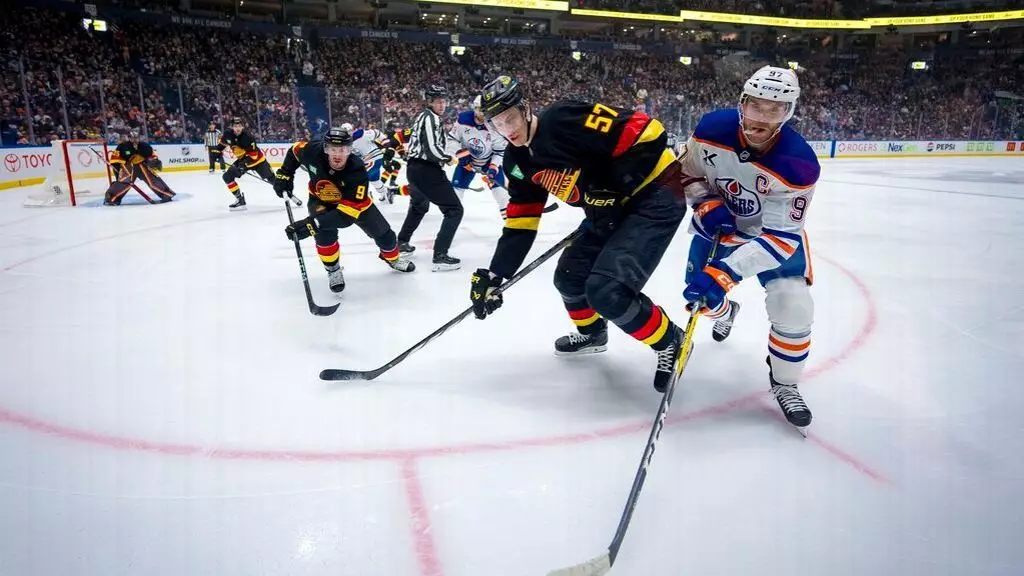The latest showdown between the Edmonton Oilers and the Vancouver Canucks was rife with tension, culminating in an unexpected display of physicality that has drawn the ire of the NHL’s Department of Player Safety. Star player Connor McDavid of the Oilers and defenseman Tyler Myers from the Canucks both received three-game suspensions following a series of dangerous cross-checks during a heated contest. This incident not only highlights the aggressive nature of rivalries in the league but also raises important questions about player safety and the enforcement of disciplinary measures.
During the match, which ended with the Canucks narrowly beating the Oilers, a fraught moment in the third period ignited the penalties. With time running out and Vancouver leading 3-2, emotions flared when McDavid found himself entangled with Canucks forward Conor Garland. As McDavid struggled to break free from Garland’s grip, he retaliated with a gloved punch before delivering a blatant cross-check to Garland’s head — an action that was not lost on the officiating crew. Myers, in a similar show of aggression, responded to a play involving Oilers defenseman Evan Bouchard with a head cross-check of his own, solidifying the chaotic atmosphere on the ice.
Revisiting Previous Behaviors
This incident marks the first significant punishment for McDavid in his otherwise stellar career, characterized by his remarkable skill and sportsmanship. Known for being one of the league’s best players, having captured the Hart Trophy multiple times, his actions in this game have now put a blot on his reputation. McDavid’s previous infractions include a brief suspension in 2019 and a minor fine in 2021, but none come close to the severity of this recent three-game ban. His frustration was palpable during the game, as he attempted to break free from holds that could have significantly affected his performance. Oilers’ coach Kris Knoblauch captured this sentiment well, emphasizing that McDavid often plays through excessive pressure without drawing the penalties he rightfully deserves.
Similarly, Myers, who has had a history of disciplinary issues, including two past suspensions for boarding and illegal checks to the head, finds himself at the center of another controversy. He claimed that his actions towards Bouchard were unintentional; however, the Department of Player Safety found otherwise. For both players, this suspension not only affects them individually but will also have ramifications for their respective teams, who must now navigate crucial games without their star players.
On one hand, the detachment from intent in punishments raises questions about how players perceive their own actions. Both McDavid and Myers have publicly articulated their beliefs that their plays were not intended to injure, yet their reckless executions resulted in serious consequences. This reality puts the spotlight on player responsibility; the line between aggression and recklessness can sometimes blur, particularly in high-stakes scenarios. The NHL’s Department of Player Safety has been explicit in establishing that actions leading to injury — regardless of intent — must be addressed assertively to maintain player safety.
As the Oilers and Canucks prepare for their next meeting without their leading figures, this incident serves as a sobering reminder of the volatility of professional sports. It emphasizes the need for all players to be vigilant about how they conduct themselves on the ice. The repercussions of aggressive plays not only impact the immediate game but also resonate throughout the season and potentially the players’ careers.
As the NHL continues to grapple with the challenges of maintaining competitive spirit while ensuring the safety of its players, the case of McDavid and Myers may signal a turning point. Since their suspensions, discussions have arisen regarding the need for stricter penalties and education surrounding violence in the league. Furthermore, this incident raises broader conversations about how to balance the physicality that defines hockey with the responsibility players hold for their actions.
While the rivalry between the Oilers and Canucks is deeply rooted and passionate, the recent events serve as a reminder that the sport holds a profound responsibility to safeguard its competitors. As players take to the ice, understanding the implications of their actions is more critical than ever. For fans, the enthralling nature of the sport comes with the understanding that passion must not come at the cost of safety. How the league manages these situations will be pivotal in shaping the future of competitive hockey.


Leave a Reply